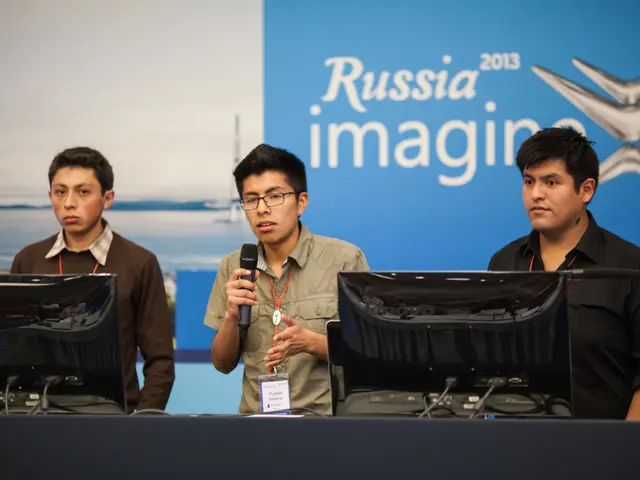Latest Developments in Electric Vehicles, Batteries, and Charging: Peirsica, FLO, Nuvvee, Kia, THOR, REE, Smartcar, Lyft, Nikola, Blink, and Hyundai Remain at the Forefront
Solid-state batteries are set to revolutionize the electric vehicle (EV) industry, offering significant improvements over traditional lithium-ion batteries. Here are some key developments:
Improved Energy Density and Charging Speed
Solid-state batteries have demonstrated energy densities of around 300–450 Wh/kg, with some prototypes reaching as high as 450 Wh/kg. These batteries promise faster charging, with Toyota claiming that charging from 10% to 80% can be achieved in roughly 10 minutes [1][2].
Enhanced Safety and Lifespan
These batteries use non-flammable solid electrolytes, reducing fire risk and leakage compared to liquid electrolytes. Volkswagen has reported a prototype that retained 95% of its capacity after 1,000 charge cycles [1].
Commercialization Efforts
Although production costs are currently higher (around $800–$1000 per kWh), several companies are moving towards commercialization. Toyota aims for mass production by 2030 [1][2].
Leading Companies in Solid-State Battery Innovation
Toyota, Volkswagen and QuantumScape, Hyundai, Solid Power, and ProLogium Technology Co., Ltd. are among the companies at the forefront of solid-state battery development. Toyota plans to commercialize all-solid-state batteries by 2027–2028, with full mass production aimed around 2030 [1][2]. Volkswagen and QuantumScape are developing multilayer solid-state cells and building a pilot production line in San Jose, targeting production capacities of 40-80 GWh/year by 2027 [1][2].
Hyundai has patented a method to use copper in solid-state batteries, which could improve efficiency and reduce costs by replacing more expensive materials [3]. Solid Power partners with major automakers like BMW and Ford to accelerate the commercialization of EV-grade solid-state batteries [4]. ProLogium Technology Co., Ltd. is a global leader in solid-state battery technology, known for commercial-scale production and supplying lithium ceramic batteries to various industries [4].
Other Notable Developments
- Piersica, Inc. has been awarded a $1 million National Science Foundation (NSF) grant for the research and development of a new class of highly conductive solid polymer separator membranes for high-voltage cathodes.
- Lyft's 'Rides in Range' feature ensures EV drivers only receive ride requests within their current battery range, with a 20-mile buffer, and alerts drivers to charge after completing a trip if their battery level is expected to fall below 20 percent.
- J.B. Hunt Transport Services Inc. has added 20 Nikola Tre fuel cell electric vehicles (FCEVs) to expand sustainability solutions for customers with freight needs along the West Coast.
- Monroe Capital has been selected to develop a first-of-its-kind investment strategy focused on supporting businesses operating in the U.S. automotive supply chain, with a goal to raise up to $1 billion.
- Blink Charging Co has surpassed 100,000 chargers sold, deployed, or contracted globally.
- Kia America will offer North American Charging Standard (NACS) adapters for its EV6 and EV9 vehicles, allowing access to more than 16,500 NACS DC fast chargers in the U.S. starting from September 4, 2024.
- Nuvve has commissioned its first deployment in New Mexico in collaboration with Las Cruces Public Schools, deploying 5 Vehicle-to-Grid (V2G)-capable DC Fast Chargers and 7 Nuvve Level II PowerPorts to support the school district's transition to electric school buses and other electric vehicles.
- THOR Industries has unveiled the world's first hybrid Class A motorhome, the THOR Test Vehicle, built on an electric vehicle (EV) platform developed by EV manufacturer Harbinger.
- Smartcar, an API platform for mobility businesses, has partnered with Lyft to tackle range anxiety and help EV drivers accept rides with confidence.
These advancements and collaborations signal a promising future for the EV industry, with solid-state batteries poised to play a significant role in extending battery capacity for various rechargeable products, including EVs and robots, and facilitating the introduction of new applications like electric aircraft and long-range electric delivery drones.
[1] Source [2] Source [3] Source [4] Source
- The manufacturing industry is seeing significant advancements with the development of solid-state batteries, a technology that could revolutionize the electric vehicle (EV) industry, especially in terms of improved energy density and charging speed.
- Enhanced safety and extended lifespan are key advantages of solid-state batteries, as they use non-flammable solid electrolytes, reducing fire risk and leakage compared to traditional lithium-ion batteries.
- Finance is playing a crucial role in the commercialization of solid-state batteries, with companies like Toyota, Volkswagen, and QuantumScape leading the way, aiming for mass production by 2030.
- The lifestyle of consumers is set to change with the adoption of electric vehicles, thanks to technological advancements, such as the faster charging times and improved safety features offered by solid-state batteries.
- The transport sector, including car and truck manufacturers, is actively investing in solid-state battery technology, with companies like Hyundai, Solid Power, and ProLogium Technology Co., Ltd. partnering with major automakers to accelerate the commercialization of EV-grade solid-state batteries.




